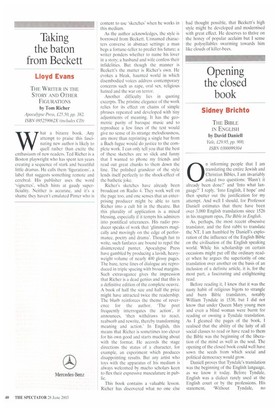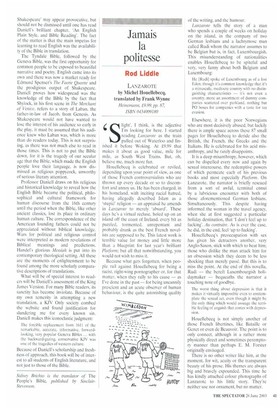Opening the closed book
Sidney Brichto
THE BIBLE IN ENGLISH by David Daniell Yale, £29.95, pp. 900, ISBN 0300099304 0 n informing people that I am translating the entire Jewish and Christian Bibles, I am invariably asked two questions: 'Hasn't it already been done?' and 'Into what language?' I reply, 'Into English, I hope' and then sputter out the justification for my attempt. And well I should, for Professor Daniell estimates that there have been over 3,000 English translations since 1526 in his magnum opus, The Bible in English.
As, perhaps, the most recent obsessive translator, and the first rabbi to translate the NT, I am humbled by Daniell's exploration of the influence of the English Bible on the civilisation of the English speaking world. While his scholarship on certain occasions might put off the ordinary reader when he argues the superiority of one translation over another on the basis of an inclusion of a definite article, it is, for the most part, a fascinating and enlightening read.
Before reading it. I knew that it was the nasty habit of religious bigots to strangle and burn Bible translators, notably William Tyndale in 1538, but I did not know that under Queen Mary young men and even a blind woman were burnt for reading or owning a Tyndale translation, As I gleaned the pages of the book, I realised that the ability of the laity of all social classes to read or have read to them the Bible was the beginning of the liberation of the mind as well as the soul. The opening of the closed book could well have sown the seeds from which social and political democracy would grow.
Daniell proves that Tyndale's translation was the beginning of the English language, as we know it today. Before Tyndale. English was a dialect rarely used at the English court or by the professions. His statement, 'Without Tyndale, no Shakespeare may appear provocative, but should not be dismissed until one has read Daniell's brilliant chapter, 'An English Plain Style, and Bible Reading'. The fact of the matter is that the main impetus for learning to read English was the availability of the Bible in translation.
The Tyndale Bible, followed by the Geneva Bible, was the first opportunity for common people to be exposed to beautiful narrative and poetry. English came into its own and there was now a market ready for Edmund Spenser's The Faerie Queene and the prodigious output of Shakespeare. Daniell proves how widespread was the knowledge of the Bible by the fact that Shylock, in his first scene in The Merchant of Venice, refers to a story of Labatt, the father-in-law of Jacob, from Genesis. As Shakespeare would not have wanted to lose the interest of his audience so early in the play, it must be assumed that hisau L. I
1ence knew who Laban was, which is more than do readers today. This is not surprising, as there was not much else to read in those times. This is not to put the Bible down, for it is the tragedy of our secular age that the Bible, which made the English people love their language, is now dismissed as religious poppycock, unworthy of serious literary attention.
Professor Daniell draws on his religious and historical knowledge to reveal how the English Bible became the political, philosophical and cultural framework for human discourse from the 16th century until the period when the Bible, like other ancient classics, lost its place in ordinary human culture. The correspondence of the American founding fathers could not be appreciated without biblical knowledge. Wars for political and religious control were interpreted as modern revelations of Biblical meanings and predictions. Handel's glorious Messiah is put into its contemporary theological setting. All these are the moments of enlightenment to be found among the more scholarly comparative descriptions of translations.
What will be of special interest to readers will be Daniell's assessment of the King James Version. For many Bible readers, its sanctity has become inviolate. Because of my own temerity in attempting a new translation, a KTV Only society combed the website and found justification for slandering me for every known sin. Daniell makes this iconoclastic judgment:
The forcible replacement from 1611 of the remarkable, accurate, informative, forwardlooking, very popular Geneva Bibles ... with the backward-gazing, conservative KJV was one of the tragedies of western culture.
Because of Daniell's scholarship and freshness of approach, this book will be of interest to all students of English literature, and not just to those of the Bible.
Sidney Brichto is the translator of The People's Bible, published by SinclairStevenson.



































































 Previous page
Previous page